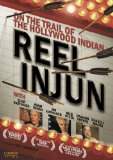| Reviews & Columns |
|
Reviews DVD TV on DVD Blu-ray 4K UHD International DVDs In Theaters Reviews by Studio Video Games Features Collector Series DVDs Easter Egg Database Interviews DVD Talk Radio Feature Articles Columns Anime Talk DVD Savant Horror DVDs The M.O.D. Squad Art House HD Talk Silent DVD
|
DVD Talk Forum |
|
|
| Resources |
|
DVD Price Search Customer Service #'s RCE Info Links |
|
Columns
|
|
|
Reel Injun
When I first heard of the documentary Reel Injun: On the Trail of the Hollywood Indian, I was more than a little bit excited. I'm a sucker for docs about film, especially those that examine aspects of cinematic history that are seldom discussed. So for me, the subject of how Native American Indians are portrayed in film--something I have been obsessed with and written about at length--was exactly what I've been waiting for. And in some ways, Reel Injun is very much what I was looking for, while in other ways it falls short of some expectations.
In what amounts to something of a personal journey, filmmaker Neil Diamond (not to be confused with the singer of the same name) sets out to find deconstruct and understand the complicated history of American Indians in motion pictures. A Native American himself, Diamond sets out on a cross-country road trip in a "rez car"--which is explained in the film--on a mission to find out how and why Indians have come to be portrayed on film the way they have. Along the way he talks to some insightful critics and historians--all of whom are interesting in their own right, but not the sort of people you want to build a documentary around. And while these talking heads really break things down, they ultimately take a backseat to the recognizable faces and names that populate Reel Injun--Clint Eastwood, Adam Beach, Wes Studi, Jim Jarmusch, Chris Eyre, John Trudell, activist Russell Means, and Sacheen Littlefeather, to name a few. No one is uninteresting, which is to say that everyone has something either informative or entertaining to share, whether it is Eastwood talking about his Outlaw Josey Wales co-star Chief Dan George, or Littlefeather explaining how she came to be the person who "accepted" Marlon Brando's Oscar for The Godfather. And to be sure, the now nearly-forgotten moment when Brando, through Littlefeather, spoke out in support of the Natives who at the time were engaged in a stand-off with federal forces at Wounded Knee, is part of what makes Reel Injun such a compelling film. Hearing Russell Means recount what it was like at Wounded Knee, when word came in of Brando's support and Littlefeather's actions, delivers a unique history lesson.
At its strongest, Reel Injun is filled with moments detailing how the world of film overlaps with real life (and vice versa), and how this overlap has played out insofar as native peoples are concerned. To be sure, Native Americans have long been on the receiving end of some very bad treatment, and Hollywood is not exempt of that treatment. But at times the film falls short of really digging into how bad things were. Diamond mentions the many white actors to don redface make-up and play Indians, but when you consider that this in and of itself could be a full documentary, the cursory examination seems a bit too abbreviated. And of course, that leads to some of what isn't even in the doc, like mention of actor Jay Silverheels, who portrayed Tonto, the Lone Ranger's faithful sidekick/savior, or the string of Billy Jack-inspired injunsploitation films like Johnny Firecloud, or the mind-blowing Thunder Warrior series from Italy, which ripped off the Rambo movies and fused them with injunsploitation conventions.
Still, despite what is missing from Reel Injun, it is outweighed by what is in the film (including some funny observations from comedian Charlie Hill). Knowing what I know, it is easy for me to say that Reel Injun is not the end-all-be-all of docs on this subject, but at the same time, it is the only documentary I know of on this subject, which means that it must do for the time being. And to be honest, when all is said and done, it does well.
Video:
Reel Injun is presented widescreen 1.85:1 ratio. The film is intercut with archival footage of varying quality, but overall the picture quality is good, with a clean presentation, solid colors, and no visible flaws or artifacts.
Audio:
Reel Injun is presented in English 2.0 Dolby Digital. The sound mix is good, with consistent audio levels and no noticeable drop-outs or distortion.
Bonus Material:
There is no bonus material on this DVD.
Final Thoughts:
Although it is not as comprehensive as I would have liked it to be--and let's be honest, no documentary ever is--Reel Injun is a compelling film that explores a part of film history that has long been ignored, making it well worth watching.
David Walker is the creator of BadAzz MoFo, a nationally published film critic, and the Writer/Director of Black Santa's Revenge with Ken Foree now on DVD [Buy it now]
|
| Popular Reviews |
| Sponsored Links |
|
|
| Sponsored Links |
|
|
| Release List | Reviews | Shop | Newsletter | Forum | DVD Giveaways | Blu-Ray | Advertise |
|
Copyright 2024 DVDTalk.com All Rights Reserved. Legal Info, Privacy Policy, Terms of Use,
Manage Preferences,
Your Privacy Choices | |||||||













